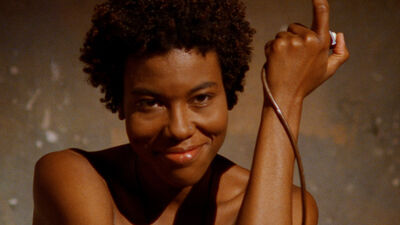So come get your film.
Yeah. They said I needed to come and get my negative. That just sent me on a whole existential journey because I thought, “I can’t properly preserve that negative. I don’t know what to do.” But they were great. They were like, “Think about archives.” So, of course, the first archive I thought up was the Black Film Center and their archive in Indiana. So I reached out to them. And they were like, “Yes, yes, yes, yes!” They were so receptive right away.
So luckily, a decade ago, I was able to put all of my elements there. All of it. The negatives and ancillary materials. I literally thought, okay, all’s well, in the world, “Naked Acts” has found it – shall I put it this way? – final resting place. I thought it was great. I’m an academic. I love the idea that scholars can discover it and study it. That was my thought. I was quite happy with that. I had no vision of it having a life beyond that. So when I tell you, Maya’s DM on Twitter changed everything.
That’s amazing. I know a few people had seen it prior to this restoration on your Vimeo.
Yes.
I think that’s a wonderful way for filmmakers to keep the distribution of their film in-house. But there is something to be said for the broader reach that someone like Kino and Milestone can bring to your film.
For sure. I made my film so long ago. I shot it back in 1994. So, it didn’t have a streaming version. It didn’t have a streaming life. I showed the film at a festival here in Brooklyn, Reel Sisters, back in 2018 to honor its 20th anniversary. The director of the festival said, “Bridgette, I can get this digitized for you.” So she did that for me. Then people were asking, “How can we see your film?” So I put it up on Vimeo. It’s exactly what you said, it gave people a way to get to it, but if they didn’t know it exists. . .
Yeah, they had to be looking.
Exactly.
In one of the presentations you did with Maya, you mentioned the video store in the film was your actual video store in Fort Greene.
Yeah. Video Basket.
I love what you said about video stores being a communal space. I think you called it a healing space. In the film, a lot of Cicely’s really big revelations are in that video store. How does it feel that you’ve kept that store alive? So many video stores are closed now.
I have to say, it’s been really beautiful to talk to people like you, My own son who’s twenty-four. I used to pick him up from school on Friday, and we would go to the video store, and would he pick up his videos for the weekend, right? Yet, my daughter, who’s four years younger than him, has no memory of that. In that little bit of time, between the late 90s and the early aughts, things changed. So we were getting our DVDs, and then eventually it was streaming. So it is beautifully nostalgic for me. But I can also see how it’s nostalgic for young adults. Like you remember those childhood experiences. So that makes me really pleased. It was an accident in a way because I was capturing a contemporary world. That was our lives. We were living as young people in the 90s. And suddenly, with the passage of time, capturing that nostalgia is speaking to all kinds of people. It’s beautiful. It’s really beautiful.

